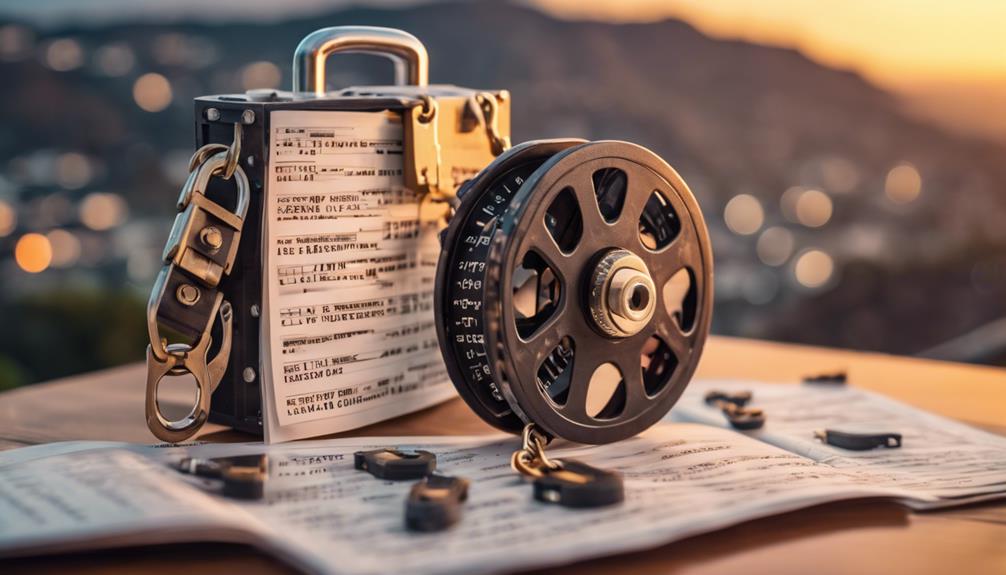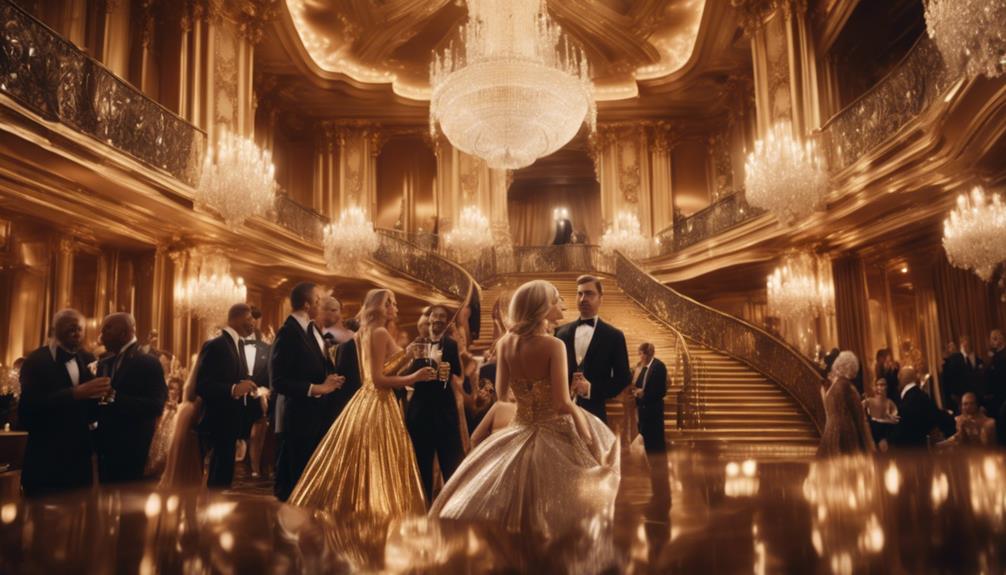In the multibillion-dollar film industry of Hollywood, intellectual property rights are essential in protecting creative works, inventions, and confidential information. Filmmakers, writers, and artists rely on copyright protection, trademark registration, and trade secrets to retain control over their innovative ideas and unique expressions. Intellectual property disputes can threaten entire productions, making prompt resolution essential. Experienced professionals can help navigate legal complexities, ensuring fair compensation for creative works and minimizing the risk of disputes. By understanding and safeguarding intellectual property rights, creatives can focus on producing high-quality content, and as they explore this complex landscape, they'll uncover the intricacies of intellectual property law in Hollywood.
Key Takeaways
• Intellectual property rights, including copyright, trademark, trade secret, and patent protection, safeguard creative works, inventions, and confidential information in Hollywood.
• Filmmakers rely on copyright protection to retain control over their intellectual property, and licensing agreements secure rights for filmmakers to use copyrighted material.
• Trademarks protect a film's unique identity for branding and merchandising, while product placement deals can help offset significant production costs in filmmaking.
• Prompt resolution of intellectual property disputes is essential to protecting creative rights, and legal representation specializing in intellectual property law is vital.
• Intellectual property expertise safeguards original works from infringement, maximizing financial rewards and ensuring fair compensation for creative works.
Understanding Intellectual Property Rights
In the competitive world of Hollywood, understanding intellectual property rights is essential for creators to safeguard their innovative ideas and prevent theft or misuse.
Intellectual property refers to the legal rights that protect creative works, inventions, and confidential information. In Hollywood, copyright protection safeguards original creative works, granting exclusive rights to creators. Trademarks help protect brand identity and distinguish products or services.
Trade secrets are important for safeguarding confidential information in the entertainment industry. Patents play a role in protecting unique inventions or processes in Hollywood.
Additionally, moral rights ensure that creators are credited for their work in the film industry. Understanding intellectual property rights is crucial for creators to maintain control over their work and prevent unauthorized use. By grasping these concepts, individuals in the entertainment industry can protect their creative rights and maintain a competitive edge.
Safeguarding Creative Works in Film

Filmmakers rely heavily on copyright protection to safeguard their creative works, ensuring they retain control over their intellectual property and reap the financial rewards.
In the film industry, copyright protection is essential for safeguarding creative works. Licensing agreements play a key role in securing rights for filmmakers, allowing them to legally use copyrighted material.
Clear chain of title documentation is necessary for distribution deals, ensuring that all parties involved have the necessary permissions. Trademarks are also used for branding and merchandising opportunities in movies, protecting a film's unique identity.
Additionally, product placement deals can help offset significant production costs in filmmaking. These legal measures are crucial for filmmakers to maintain control over their intellectual property and maximize their creative works' potential.
Protecting Intellectual Property Assets

Creative assets are the lifeblood of Hollywood, and safeguarding them is essential for filmmakers to maintain control over their intellectual property and maximize their creative works' potential.
In the entertainment industry, intellectual property protection is important to guarantee that creative rights are respected and protected. This involves safeguarding various types of intellectual property, including:
- Copyright: Protecting creative works like films, scripts, and music from unauthorized use or duplication.
- Trademark: Registering brand identities and logos to prevent others from using similar marks.
- Trade Secrets: Keeping valuable information, such as production processes or marketing strategies, confidential.
Resolving IP Disputes in Hollywood

Hollywood's intellectual property disputes can escalate quickly, threatening to derail entire productions and put millions of dollars at risk, making prompt resolution essential to protecting creative rights.
IP disputes can have a significant impact on creative projects, financial investments, and the industry's reputation as a whole. To navigate these complex disputes, it's vital to engage legal representation that specializes in intellectual property law. This expertise can help identify infringement risks, assess the impact of IP disputes, and develop strategies for resolution.
Negotiation, mediation, and litigation are all viable options for resolving IP disputes in Hollywood. By taking proactive measures to safeguard intellectual property, the entertainment industry can minimize the risk of disputes and protect creative rights.
Effective dispute resolution is critical to ensuring that creative projects can move forward without interruption, and that the rights of creators are protected.
Leveraging IP Expertise for Success

By leveraging intellectual property expertise, artists and producers can safeguard their original works from infringement and maximize their financial rewards in the competitive entertainment industry. This expertise is vital in helping filmmakers navigate the complexities of intellectual property law, ensuring that their creative rights are protected and their intellectual property rights are valued.
Effective IP management is essential for success in Hollywood, where original works are the lifeblood of the industry. By enlisting the help of IP professionals, filmmakers can:
- Protect their creative assets from infringement and unauthorized use.
- Maximize their financial rewards by ensuring they receive fair compensation for their work.
- Navigate legal complexities with confidence, knowing that their intellectual property rights are being safeguarded by experienced professionals.
With meticulous guidance from IP lawyers, filmmakers can focus on creating high-quality content, knowing that their creative endeavors are protected and their intellectual property rights are secure.
Frequently Asked Questions
What Are the Intellectual Property Rights in the Film Industry?
They identify five key intellectual property rights in the film industry.
Copyright protection covers scripts, production elements, and distribution rights.
Trademarks safeguard brand identity and merchandising opportunities.
Trade secrets protect confidential information related to film production and business strategies.
Patents defend unique inventions or technological innovations used in filmmaking.
What Are the Intellectual Property Rights of Creatives?
Creatives, including writers, directors, and producers, hold various intellectual property rights. They own copyrights to their original scripts, screenplays, and musical compositions.
Trademarks safeguard their brand identities and logos. Patents protect novel production methods or special effects techniques.
Trade secrets shield confidential information, like filming locations or casting decisions. Moral rights guarantee they receive credit and maintain control over their work.
What Protects a Creator's Right to Their Intellectual Property?
Creators' rights to their intellectual property are safeguarded by various forms of protection. Copyrights shield original works, trademarks defend brand identities, and trade secrets secure confidential information.
Patents grant exclusive rights to innovative inventions, while moral rights guarantee creators receive credit for their work. These protections empower creators to maintain control over their intellectual property, allowing them to reap the benefits of their creative endeavors.
Which of the Following Is an Intellectual Property Protection for Movies?
She identifies copyright protection as a key intellectual property right for movies, safeguarding the expression of ideas in film productions.
Trademark protection is also essential, covering movie titles, logos, and branding elements.
Additionally, trade secrets may be utilized to protect confidential information related to movie scripts, production processes, or marketing strategies.
Conclusion
In summary, safeguarding intellectual property rights is vital in Hollywood, where creative works are valuable assets.
The 2011 lawsuit between Warner Bros. and the heirs of Superman's creators, Jerry Siegel and Joe Shuster, highlights the significance of IP protection.
The court ruling in favor of Warner Bros. reinforced the importance of clear contracts and agreements to avoid disputes.
By prioritizing IP protection, filmmakers can uphold the integrity of their creative works and avoid costly legal battles.










